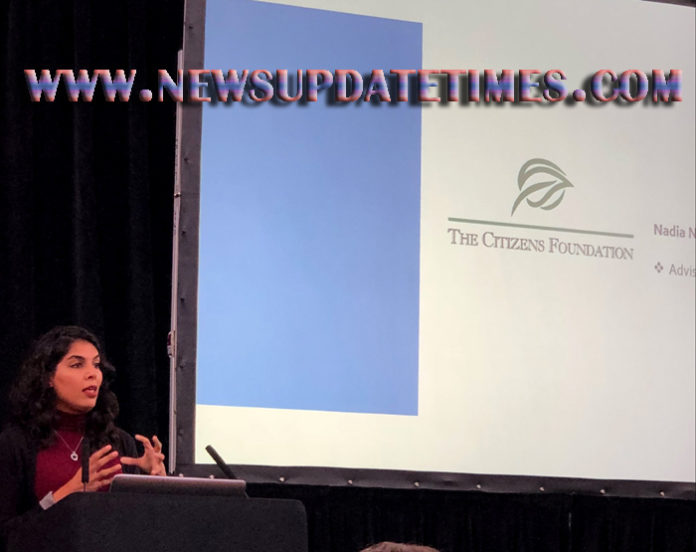Lahore – The Citizens Foundation (TCF) had the honour to be the only non-profit from Pakistan to participate in the World Literacy Summit 2018 held on March 25-27, 2018 at the Sheldonian Theatre, Oxford University, UK. In line with this year’s theme, Nadia Naviwala, on behalf of TCF, presented a keynote speech explaining TCF’s work in the field of education for the less privileged children in Pakistan, specifically their Adult Literacy Programme Aagahi, which literally means ‘awareness’. TCF has been mentioned by ‘The Economist’ as perhaps the largest network of independently run not-for-profit schools in the world. Additionally, employing 12,000 women as an all-female faculty makes it the largest private sector women employer in Pakistan.
The Aagahi programme aims at creating meaningful interventions to impart basic reading and writing skills to older women and young girls who have never been to school before.
In her keynote speech titled, “Getting 10,000 Mothers & Out-of-School Girls to Literacy & Numeracy Every Year in Pakistan,” Nadia Naviwala, an advisor to The Citizens Foundation and a fellow with the Woodrow Wilson Center, informed the audience about TCF’s large-scale effort to address the education crisis in Pakistan, where almost half of the country’s population is illiterate.
Talking about TCF model, Nadia said, “TCF sustains on philanthropy. TCF was started by a group of CEOs in 1995. They sat down at a table armed with pencil, paper, and made lists of problems that Pakistan has: health, poverty, female disempowerment, and intolerance. And they decided that the root of all these problems was a lack of access to education. They agreed on a crazy, unrealistic goal: to build 1,000 schools in Pakistan. But there was one stipulation: That these would not be poor schools for poor children.”
She further added, “A Pew survey has found that parents in Pakistan believe that schooling is equally import for girls and boys. But there are real barriers, such as the distance to school, the presence of male teachers, and the expense. If you solve for these problems, as TCF has done, you will end up with an equal ratio of boys and girls in schools. Even beyond TCF, the gender gap has narrowed in parts of Pakistan. TCF is too good to be true. And I’ll tell you that if you’re looking for a catch, there isn’t one. But I’ll also tell you that the people who work at TCF are never satisfied. We’re constantly innovating and implementing new systems to improve the quality of education in our schools and figuring out ways to expand our impact.”
“Aagahi meaning ‘Awareness’ is a female adult literacy program that is run in our schools after school and in community spaces, which are often women’s homes. We started it because teachers were sending home notes with the kids that mothers couldn’t read. And in parent-teacher meetings, mothers admitted that they couldn’t read or understand their children’s homework. Parent-teacher meetings are actually where we recruit women into the program. And over time, as women see other women walking to school, they join in. And that’s how the program grows. Every year, we get 11,000 women and girls to literacy, numeracy, and basic life skills through 800 centers across the country,” Nadia explained.
In 2008, the people behind the World Literacy Foundation conceived the idea of a World Literacy Summit. This global event was envisaged to provide leaders in the developed and developing world, the opportunity to come together, and form an action plan which would build long term, sustainable solutions to reduce the global crisis of illiteracy. This year’s theme of the conference, ‘Closing the literacy gap in the 21st Century,’ is set to initiate discussion, collaboration and bring forward solutions to help 750 million people globally who are unable to read or write.
The non-profit organisation is providing quality education to 220,000 children through nearly 1,500 purpose-built school units located in the heart of Pakistan’s urban slums and rural communities. The organisation ensures that girls represent nearly 50 per cent of overall student enrolment.






